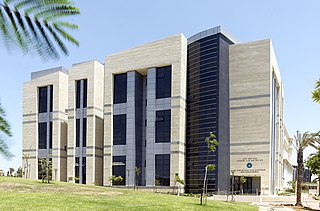
Neuroscience is the scientific study of the nervous system, its functions and disorders. It is a multidisciplinary science that combines physiology, anatomy, molecular biology, developmental biology, cytology, psychology, physics, computer science, chemistry, medicine, statistics, and mathematical modeling to understand the fundamental and emergent properties of neurons, glia and neural circuits. The understanding of the biological basis of learning, memory, behavior, perception, and consciousness has been described by Eric Kandel as the "epic challenge" of the biological sciences.

Cognitive neuroscience is the scientific field that is concerned with the study of the biological processes and aspects that underlie cognition, with a specific focus on the neural connections in the brain which are involved in mental processes. It addresses the questions of how cognitive activities are affected or controlled by neural circuits in the brain. Cognitive neuroscience is a branch of both neuroscience and psychology, overlapping with disciplines such as behavioral neuroscience, cognitive psychology, physiological psychology and affective neuroscience. Cognitive neuroscience relies upon theories in cognitive science coupled with evidence from neurobiology, and computational modeling.
Computational neuroscience is a branch of neuroscience which employs mathematics, computer science, theoretical analysis and abstractions of the brain to understand the principles that govern the development, structure, physiology and cognitive abilities of the nervous system.
The following outline is provided as an overview of and topical guide to neuroscience:
The Helen Wills Neuroscience Institute (HWNI) at the University of California, Berkeley was created in 1997, through a bequest from eight-time Wimbledon champion Helen Wills Moody, an alumna of UC Berkeley.
The Krasnow Institute for Advanced Study brings together researchers from many disciplines to study the phenomenon known as the mind. A unit of George Mason University, the Krasnow Institute also serves as a center for doctoral education in neuroscience. Research at the institute is funded by agencies such as the National Institutes of Health, the National Science Foundation and the Department of Defense.

Stephen Grossberg is a cognitive scientist, theoretical and computational psychologist, neuroscientist, mathematician, biomedical engineer, and neuromorphic technologist. He is the Wang Professor of Cognitive and Neural Systems and a Professor Emeritus of Mathematics & Statistics, Psychological & Brain Sciences, and Biomedical Engineering at Boston University.
Neuroinformatics is the field that combines informatics and neuroscience. Neuroinformatics is related with neuroscience data and information processing by artificial neural networks. There are three main directions where neuroinformatics has to be applied:

The Princeton University Department of Psychology, located in Peretsman-Scully Hall, is an academic department of Princeton University in Princeton, New Jersey. For over a century, the department has been one of the most notable psychology departments in the country. It has been home to psychologists who have made well-known scientific discoveries in the fields of psychology and neuroscience.

Eve Marder is a University Professor and the Victor and Gwendolyn Beinfield Professor of Neuroscience at Brandeis University. At Brandeis, Marder is also a member of the Volen National Center for Complex Systems. Dr. Marder is known for her pioneering work on small neuronal networks which her team has interrogated via a combination of complementary experimental and theoretical techniques.
Hyunjune Sebastian Seung is President at Samsung Electronics & Head of Samsung Research and Anthony B. Evnin Professor in the Princeton Neuroscience Institute and Department of Computer Science. Seung has done influential research in both computer science and neuroscience. He has helped pioneer the new field of connectomics, "developing new computational technologies for mapping the connections between neurons," and has been described as the cartographer of the brain.

Gualtiero Piccinini is an Italian–American philosopher known for his work on the nature of mind and computation as well as on how to integrate psychology and neuroscience. He is Curators' Distinguished Professor in the Philosophy Department and Associate Director of the Center for Neurodynamics at the University of Missouri, St. Louis.

The Center for Neurotechnology (CNT) is an Engineering Research Center funded by the National Science Foundation to create devices to restore the body's capabilities for sensation and movement. The National Science Foundation has awarded the CNT $~30 million since 2011.
David W. Tank is an American molecular biologist and neuroscientist who is the Henry L. Hillman Professor in Molecular Biology at Princeton University and the co-director of the Princeton Neuroscience Institute along with psychology professor Jonathan Cohen.

The Department of Brain and Cognitive Sciences at the Massachusetts Institute of Technology, Cambridge, Massachusetts, United States, engages in fundamental research in the areas of brain and neural systems, and cognitive processes. The department is within the School of Science at the MIT and began initially as the Department of Psychology founded by the psychologist Hans-Lukas Teuber in 1964. In 1986 the MIT Department of Psychology merged with the Whittaker College integrating Psychology and Neuroscience research to form the Department of Brain and Cognitive Sciences.
Ilana B. Witten is an American neuroscientist and professor of psychology and neuroscience at Princeton University. Witten studies the mesolimbic pathway, with a focus on the striatal neural circuit mechanisms driving reward learning and decision making.

Kanaka Rajan is a computational neuroscientist in the Department of Neurobiology at Harvard Medical School and founding faculty in the Kempner Institute for the Study of Natural and Artificial Intelligence at Harvard University. Rajan trained in engineering, biophysics, and neuroscience, and has pioneered novel methods and models to understand how the brain processes sensory information. Her research seeks to understand how important cognitive functions — such as learning, remembering, and deciding — emerge from the cooperative activity of multi-scale neural processes, and how those processes are affected by various neuropsychiatric disease states. The resulting integrative theories about the brain bridge neurobiology and artificial intelligence.

Sabine Kastner is a German-born American cognitive neuroscientist. She is professor of psychology at the Princeton Neuroscience Institute at Princeton University. She also holds a visiting scientist appointment at the University of California at Berkeley.

The Leslie and Susan Gonda Multidisciplinary Brain Research Center is a multidisciplinary neuroscience institution, housed at Bar-Ilan University.












